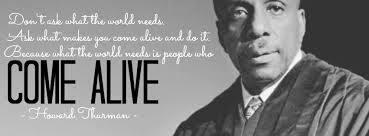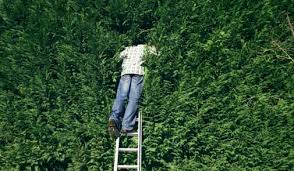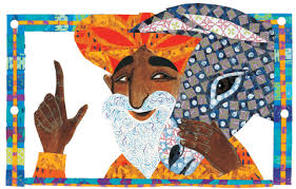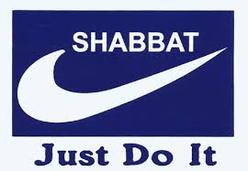|
Week after week, from one Shabbat to another, and especially when they would eat their Shabbat meal together with their Hasidi - when they would speak words of Torah, Rabbi Elimelech and Rabbi Zusya, two Hasidic Rebbes, two Hasidic masters, were overcome by a feeling of holiness.
Once when they were in private together, Rabbi Elimelech said to Rabbi Zusya, “Brother, I am sometimes afraid that my feeling of holiness on the Sabbath may not be a true feeling, and if so, my service to G!d may mot be the right kind of service.” Rabbi Zusya said, “Brother, I too am afraid of the very same thing.” “What should we do about?,” asked Elimelech. And Zusya replied, “Let each of us on a weekday, prepare a meal which is exactly like the Sabbath meal. Let us then invite our Hasidim to join us, and let us teach the kinds of words of Torah that we ordinarily do. And then if it happens on that day, in midweek, that we still have the same feeling of holiness, we will know that our way is not the true way. But if we do not feel anything special, it will prove that our Saturday way is correct.” Well, they did exactly what they said. They prepared the Sabbath meal. They put on their Shabbas clothes. They put on the streimels that they would only wear on Shabbas. They ate with the Hasidim; they spoke words of Torah; and sure enough, the feeling of holiness overcame them, just as it did on Shabbas.. And so when they were alone together, Rabbi Elimelech said, “Brother, what should we do?” They were in a state of deep emotional and spiritual crisis. So he said, “Let us go to the great Rabbi of Mezhirech; let us ask him.” So they did. They spoke to the Maggid of Mezhirech. They told him their dilemma, and he said to them, “If you put on Sabbath clothes and Sabbath hats, and speak words of Torah and share a meal and song with your Hasidim, it is quite right that you had a feeling of Sabbath holiness. Because all of those things together have the power of drawing the light of Shabbat holiness, down to earth. You need have no fears.” *************************************************************************** Have you enjoyed reading my posts? Only a few left to go before R' Zalman's first yahrtzeit. Please consider offering a tax deductible donation to support this project and the work of DC's Jewish Renewal community Minyan Oneg Shabbat. Thank you, R' Mark
0 Comments
 This story appears in Rabbi Shefa Gold's Torah Journeys. It is even more powerful for me in these last days before Shavuot. See you at Sinai. Again. חג שמח There is a story about some jealous angels who are asked to hide the spark of the Divine in the world.
"Let's put it atop the highest mountain," offers one. "No," says another," the Human is very ambitious. He will find it there." "Well then, let's bury it beneath the deepest sea." "That won't work either," another chimes in. "The Human is very resourceful. She will even find it there." After a moment's thought the wisest angel says, "I know. Put it inside the Human heart. They will never look there." *************************************************************************** Have you enjoyed reading my posts? Only a few left to go before R' Zalman's first yahrtzeit. Please consider offering a tax deductible donation to support this project and the work of DC's Jewish Renewal community Minyan Oneg Shabbat. Thank you, R' Mark  One of the first stories I ever heard R' Zalman tell was this one, about his initial meeting with Howard Thurman. Sara Davidson captures it beautifully in her book, The December Project. Sections of the following are also taken from Reb Zalman's First Steps to a New Jewish Spirit. I wish you Shabbat Shalom and a meaningful encounter at Sinai. See you there. Again. ************************** As a young rabbi in New Bedford, Massachusetts, in 1955, Zalman used to rise at four in the morning to drive to Boston, where he was taking graduate classes on psychology and pastoral couseling. Arriving at Boston University at seven, he needed to davven, but Hillel House was closed. Most buildings on campus were shut except for March Chapel, so he wandered through it, looking for a place to conduct his morning prayers. In one room he found a statue of Jesus, in another a large brass cross on the altar. At length he found a supply room that had no Christian symbols and did his davening there.
A tall black man - Zalman assumed he was the janitor - saw him one morning and asked, "Is there a reason you don't pray in the chapel?" Zalman said it was because of the Christian symbols. "In my guts and heart, it doesn't feel right." "Why don't you look tomorrow morning and see if you'd like to say your prayers there?" the man said. Curious, Zalman entered the chapel the next morning and found the brass cross had been taken off the altar and placed in a corner. He went to the lectern and saw the Bible open to Psalm 139, containing the words: Whither shall I flee from thy presence? If I ascend to heaven, thou art there... Of course, Zalman thought. When he finished davening, he turned the Bible to Psalm 100, a prayer of thanksgiving, then left the chapel and went to his class. In the days that followed, "this man and I were sending messages to each other through the Bible, and I still didn't know who he was," Zalman told me. In the spring, he wanted to take a course listed as "Spiritual Disciplines and resources, with Labs." Labs? What would that be? He requested an appointment with the professor "to see if he was going to try to make a Christian out of me. If he was, I didn't want to take the course." When Zalman walked into the professor's office, he saw the black man he'd assumed was a janitor. It was Howard Thurman, dean of Marsh Chapel, a legendary ecumenical leader who later would be a mentor to Martin Luther King Jr. Thurman offered Zalman a mug of coffee, and Zalman explained his concerns. "I want to take your course, but I don't know if my spiritual anchors are long enough." He put his coffee mug on his desk and began to look at his hands. He turned them palms up, then palms down. The backs of his hands were very dark, and his palms were very light. He turned them back and forth, looking at them, as if considering the light and dark sides of the argument. This lasted for several minutes, but it felt like hours to me. He did what he was doing with such a calm certainty that he seemed to possess great power. Suddenly he spoke, "Don't you trust the Ruach HaKodesh?" I was stunned. He'd used the Hebrew words for the Spirit of Holiness, something I had not expected from a gentile. And in so doing, he brought the question home to me in a particularly strong way. I began to tremble and walked out of his office without answering him. For the next three weeks I went through torment struggling with the question. Did I indeed trust the Ruach haKodesh, trust It enough to have faith in my self-identity as a Jew? Or was I holding back, fearful of testing my belief in an encounter with another religion, unnerved by the prospect of trusting my soul to a non-Jew? If I was fearful, it meant I did not truly believe. Finally I realized that his question could have only one answer. "Don't you trust the Ruach haKodesh?" Dean Thurman had said. I had to say "Yes, I do," and I signed up for his course. .....in the exchanges with Dean Thurman I learned an important lesson, which is still at the center of my thinking: Judaism and all the other Western religions are suffering from having become oververbalized and underexperienced. Someone else's description of ecstasy is not enough. I wanted to have the experience myself, and I'd like to help make it possible for other people to have it too. ****************** Thank you Reb Zalman - you accomplished your task. Have you enjoyed reading my posts? Only a few left to go before R' Zalman's first yahrtzeit. Please consider offering a tax deductible donation to support this project and the work of DC's Jewish Renewal community Minyan Oneg Shabbat. Thank you, R' Mark  R' David Zaslow told this story during the R' Zalman Legacy Shabbaton in Ashland, OR two weeks ago. Priceless. R' David: True story – Boulder, 2000. At a Friday morning service in Boulder, CO. Rabbi Twersky from Denver and his team were leading davvenen getting ready for a shabbaton they were leading that weekend. Reb Twersky and Rabbi Zalman were standing at the window and chatting during the early part of the davvenen. They were chatting and pointing outside while watching a gardener trim the overgrown hedges. Reb Zalman comes back to me and says, “Duvid Leibyn, do you want to know what we said to each other.” I replied, “Yes, of course!” Reb Twersky: Zalman, do you see those hedges after they have been trimmed? They look very bad, don’t they? That's what happens when you trim too much. Reb Zalman: Sure, for a while they won’t look so great, but do you see the hedges that haven’t been trimmed? Reb Twersky: Yes, I see them. Reb Zalman: Well, do you know what happens when they don’t get trimmed? They get so overgrown they choke themselves, and they won’t live much longer. Rabbi Twersky looked over at Reb Zalman telling me the story. He smiled at me from across the room, shaking his head, and shrugging his shoulders as if to say, “Reb Zalman’s got a point!” ****************** Have you enjoyed reading the stories? Please consider offering a tax deductible donation to support this project and the work of DC's Jewish Renewal community Minyan Oneg Shabbat. Thank you.  Mulla Nasrudin was resting under the shade of a tall and luscious walnut tree. As he sat daydreaming, he noticed huge pumpkins growing on delicate vines snaking across the ground. Then he looked up and squinted to see the tiny walnuts growing on the magnificent tree. “How strange mother nature is,” he thought, “to make plump pumpkins grow on spindly vines while little walnuts have their own impressive tree.” Just then, a walnut fell from above and landed with a ‘tock’ on Mullah Nasruddin’s head. The mullah rubbed his sore head, picked up the fallen walnut, and looked high up towards the branches of the tree. Then, he looked over thankfully at the swollen pumpkins growing safely on the ground. “Oh mother nature, you are wise!” ****************** As soon as he had intoned the Call to Prayer from his minaret, the Mulla was seen rushing away from the mosque. Someone shouted: "Where are you going, Nasrudin?" The Mulla yelled back: "That was the most penetrating call I have ever given. I'm going as far as I can to see at what distance it can be heard." (Tales from The Pleasantries of the Incredible Nasrudin by Idries Shah) ****************** Please consider offering a tax deductible donation to support this project and the work of DC's Jewish Renewal community Minyan Oneg Shabbat. Thank you. |
Mark Novak is a "free-range" rabbi who lives in Washington DC and works, well, just about everywhere. In 2012 he founded Minyan Oneg Shabbat, home to MOSH (Minyan Oneg Shabbat), MindfulMOSH (Jewish mindfulness gathering), and Archives
June 2017
Categories
All
|

 RSS Feed
RSS Feed
